Australian Migration Law: Visa Applications and Conditions
VerifiedAdded on 2022/08/18
|12
|2409
|13
Report
AI Summary
This report analyzes a case study involving Elisa, a visitor to Australia, and her various visa applications. The report examines her eligibility for a Class GK (Subclass 482) Visa, considering the conditions imposed on her Visitor Visa (Subclass 600), particularly condition 8503, which restricts further visa applications within Australia. It further explores the implications of conditions 8101, 8201, 8501, and 8558 on her visa. The report also assesses the status of her Working Holiday (Subclass 417) visa application, highlighting her ineligibility due to her location and nationality, along with the requirement to apply from outside of Australia. Finally, the report addresses breaches of the Australian Migration Agents Regulations by Elisa's former migration agent, including record-keeping failures and misleading advice regarding visa applications, referencing relevant sections of the Migration Act and Regulations to support its findings. The report concludes by emphasizing the importance of compliance with migration laws and regulations for both visa applicants and migration agents.
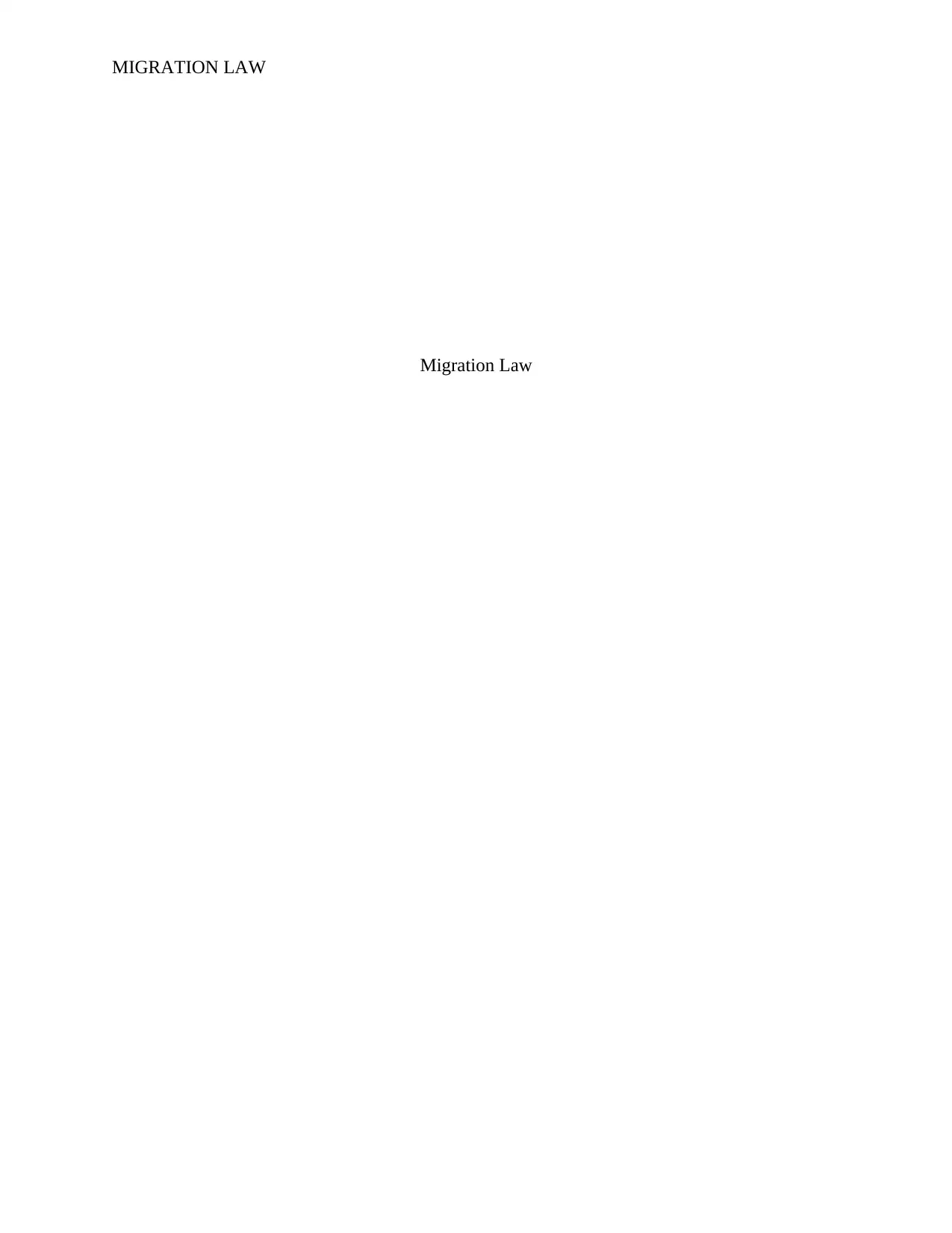
MIGRATION LAW
Migration Law
Migration Law
Paraphrase This Document
Need a fresh take? Get an instant paraphrase of this document with our AI Paraphraser
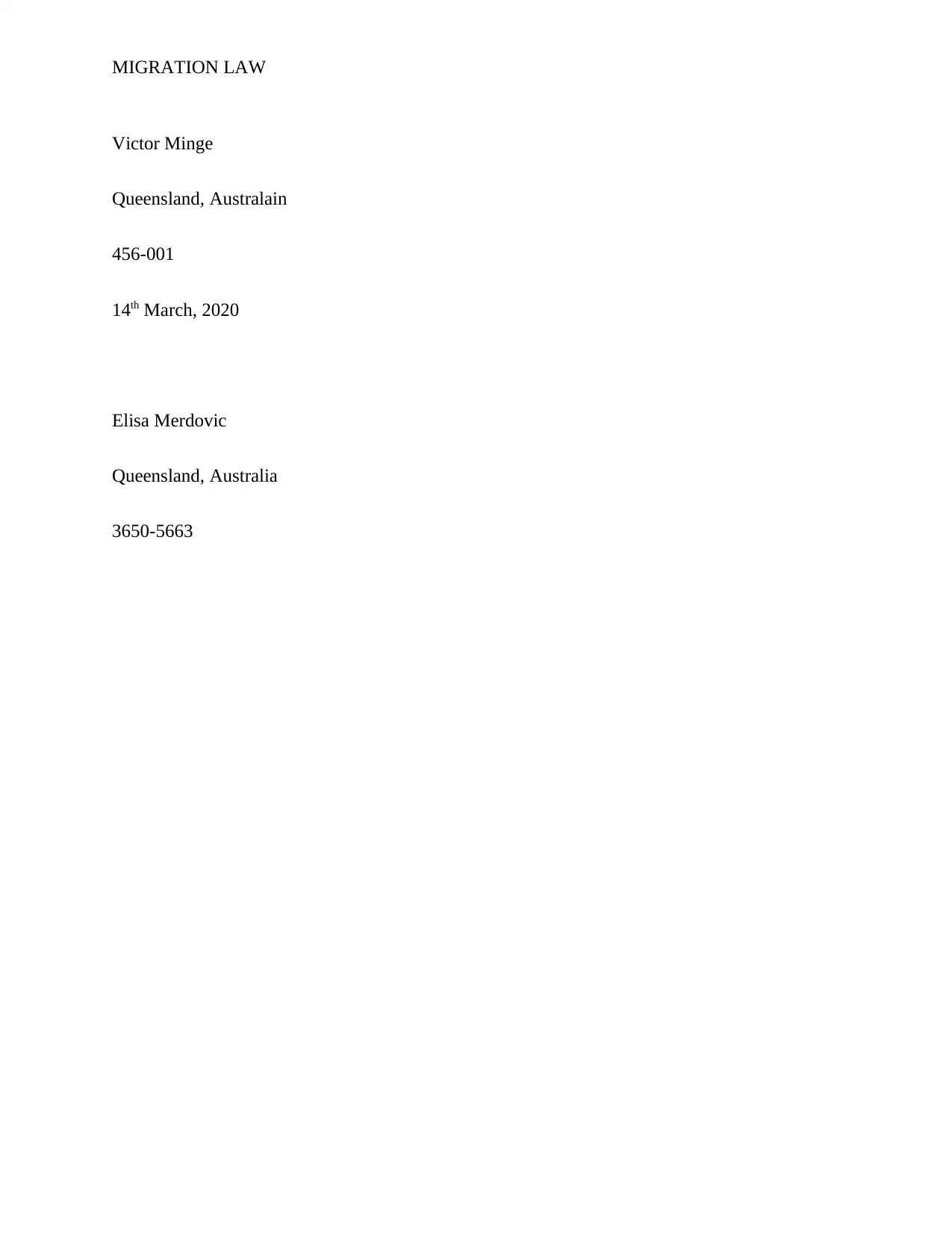
MIGRATION LAW
Victor Minge
Queensland, Australain
456-001
14th March, 2020
Elisa Merdovic
Queensland, Australia
3650-5663
Victor Minge
Queensland, Australain
456-001
14th March, 2020
Elisa Merdovic
Queensland, Australia
3650-5663
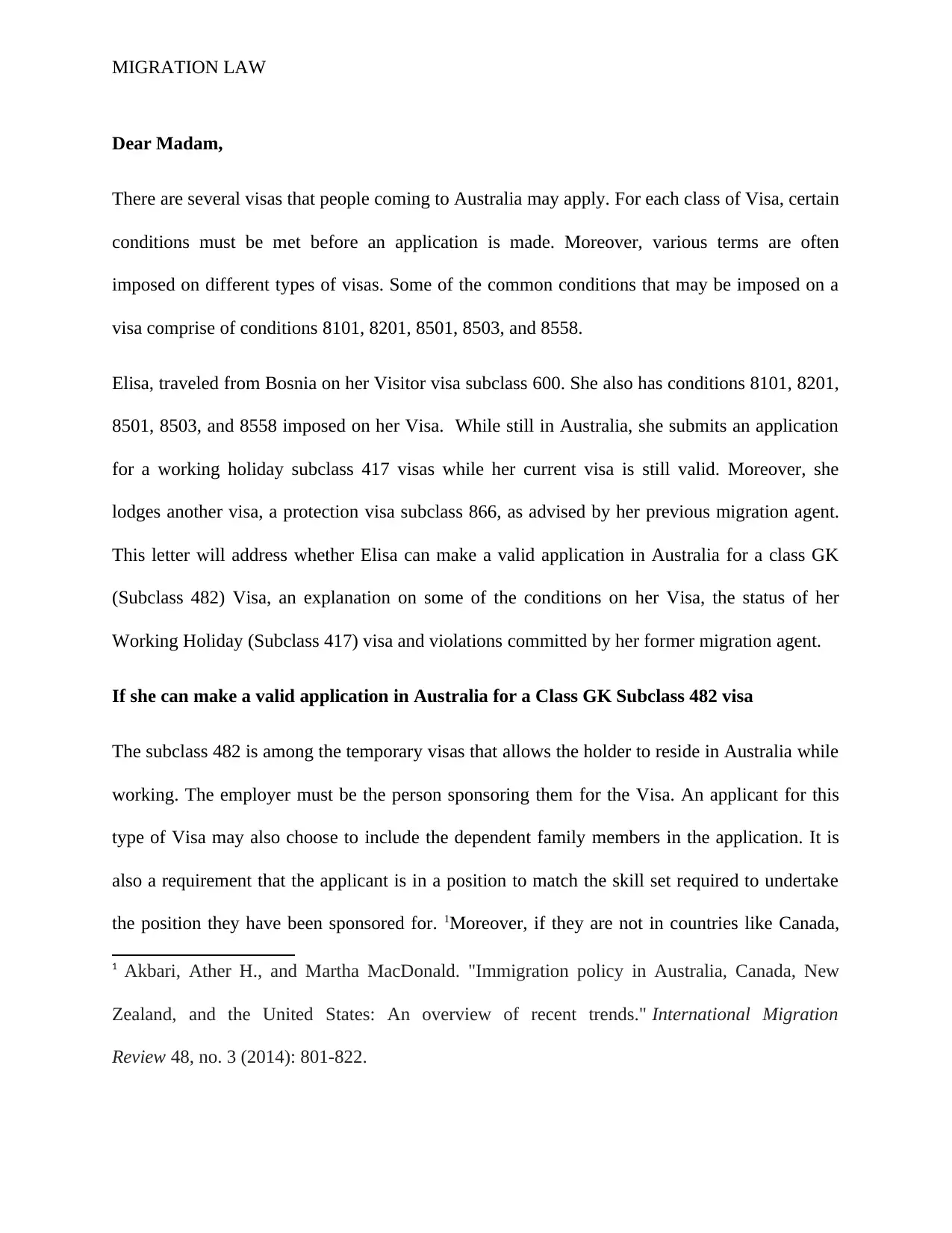
MIGRATION LAW
Dear Madam,
There are several visas that people coming to Australia may apply. For each class of Visa, certain
conditions must be met before an application is made. Moreover, various terms are often
imposed on different types of visas. Some of the common conditions that may be imposed on a
visa comprise of conditions 8101, 8201, 8501, 8503, and 8558.
Elisa, traveled from Bosnia on her Visitor visa subclass 600. She also has conditions 8101, 8201,
8501, 8503, and 8558 imposed on her Visa. While still in Australia, she submits an application
for a working holiday subclass 417 visas while her current visa is still valid. Moreover, she
lodges another visa, a protection visa subclass 866, as advised by her previous migration agent.
This letter will address whether Elisa can make a valid application in Australia for a class GK
(Subclass 482) Visa, an explanation on some of the conditions on her Visa, the status of her
Working Holiday (Subclass 417) visa and violations committed by her former migration agent.
If she can make a valid application in Australia for a Class GK Subclass 482 visa
The subclass 482 is among the temporary visas that allows the holder to reside in Australia while
working. The employer must be the person sponsoring them for the Visa. An applicant for this
type of Visa may also choose to include the dependent family members in the application. It is
also a requirement that the applicant is in a position to match the skill set required to undertake
the position they have been sponsored for. 1Moreover, if they are not in countries like Canada,
1 Akbari, Ather H., and Martha MacDonald. "Immigration policy in Australia, Canada, New
Zealand, and the United States: An overview of recent trends." International Migration
Review 48, no. 3 (2014): 801-822.
Dear Madam,
There are several visas that people coming to Australia may apply. For each class of Visa, certain
conditions must be met before an application is made. Moreover, various terms are often
imposed on different types of visas. Some of the common conditions that may be imposed on a
visa comprise of conditions 8101, 8201, 8501, 8503, and 8558.
Elisa, traveled from Bosnia on her Visitor visa subclass 600. She also has conditions 8101, 8201,
8501, 8503, and 8558 imposed on her Visa. While still in Australia, she submits an application
for a working holiday subclass 417 visas while her current visa is still valid. Moreover, she
lodges another visa, a protection visa subclass 866, as advised by her previous migration agent.
This letter will address whether Elisa can make a valid application in Australia for a class GK
(Subclass 482) Visa, an explanation on some of the conditions on her Visa, the status of her
Working Holiday (Subclass 417) visa and violations committed by her former migration agent.
If she can make a valid application in Australia for a Class GK Subclass 482 visa
The subclass 482 is among the temporary visas that allows the holder to reside in Australia while
working. The employer must be the person sponsoring them for the Visa. An applicant for this
type of Visa may also choose to include the dependent family members in the application. It is
also a requirement that the applicant is in a position to match the skill set required to undertake
the position they have been sponsored for. 1Moreover, if they are not in countries like Canada,
1 Akbari, Ather H., and Martha MacDonald. "Immigration policy in Australia, Canada, New
Zealand, and the United States: An overview of recent trends." International Migration
Review 48, no. 3 (2014): 801-822.
⊘ This is a preview!⊘
Do you want full access?
Subscribe today to unlock all pages.

Trusted by 1+ million students worldwide
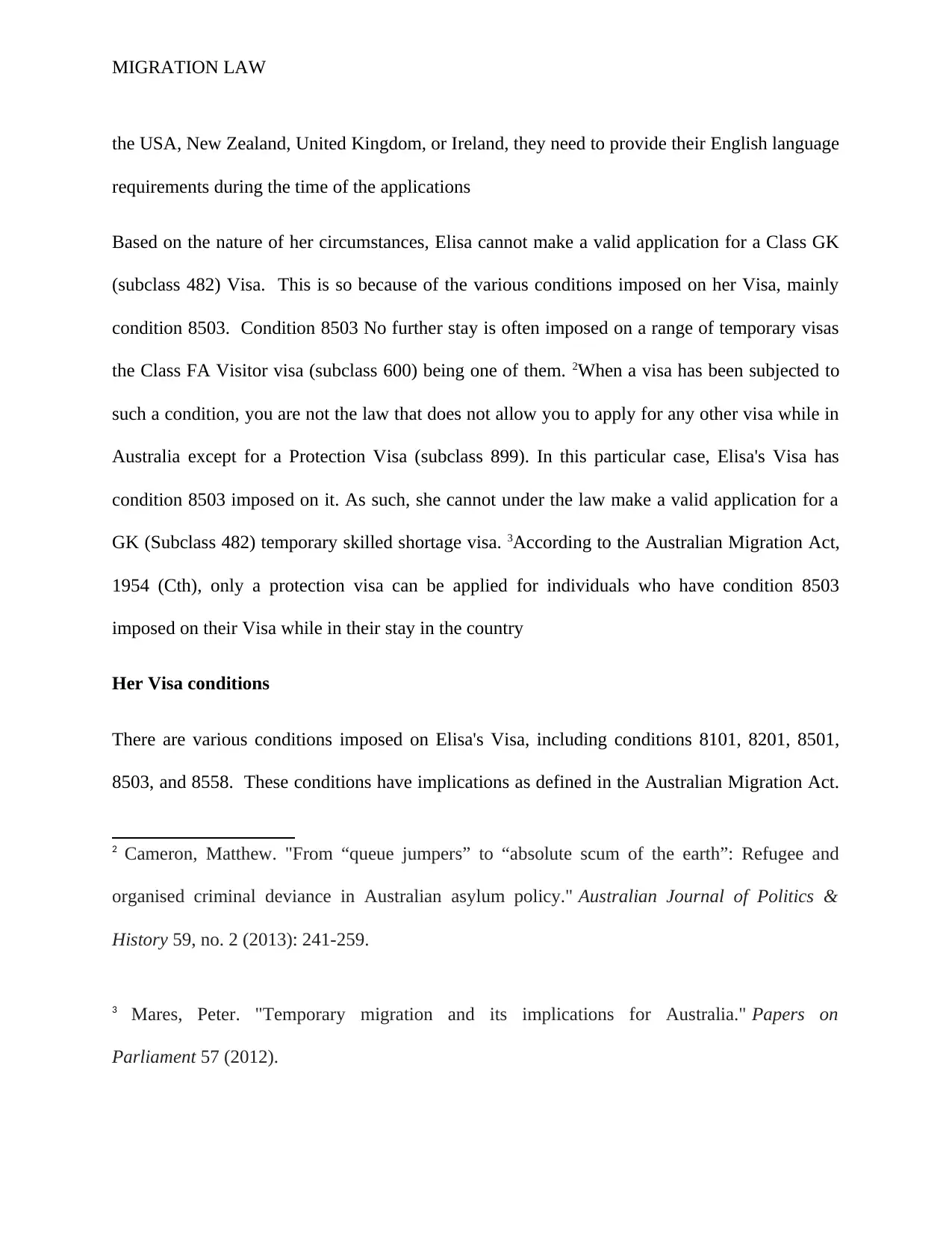
MIGRATION LAW
the USA, New Zealand, United Kingdom, or Ireland, they need to provide their English language
requirements during the time of the applications
Based on the nature of her circumstances, Elisa cannot make a valid application for a Class GK
(subclass 482) Visa. This is so because of the various conditions imposed on her Visa, mainly
condition 8503. Condition 8503 No further stay is often imposed on a range of temporary visas
the Class FA Visitor visa (subclass 600) being one of them. 2When a visa has been subjected to
such a condition, you are not the law that does not allow you to apply for any other visa while in
Australia except for a Protection Visa (subclass 899). In this particular case, Elisa's Visa has
condition 8503 imposed on it. As such, she cannot under the law make a valid application for a
GK (Subclass 482) temporary skilled shortage visa. 3According to the Australian Migration Act,
1954 (Cth), only a protection visa can be applied for individuals who have condition 8503
imposed on their Visa while in their stay in the country
Her Visa conditions
There are various conditions imposed on Elisa's Visa, including conditions 8101, 8201, 8501,
8503, and 8558. These conditions have implications as defined in the Australian Migration Act.
2 Cameron, Matthew. "From “queue jumpers” to “absolute scum of the earth”: Refugee and
organised criminal deviance in Australian asylum policy." Australian Journal of Politics &
History 59, no. 2 (2013): 241-259.
3 Mares, Peter. "Temporary migration and its implications for Australia." Papers on
Parliament 57 (2012).
the USA, New Zealand, United Kingdom, or Ireland, they need to provide their English language
requirements during the time of the applications
Based on the nature of her circumstances, Elisa cannot make a valid application for a Class GK
(subclass 482) Visa. This is so because of the various conditions imposed on her Visa, mainly
condition 8503. Condition 8503 No further stay is often imposed on a range of temporary visas
the Class FA Visitor visa (subclass 600) being one of them. 2When a visa has been subjected to
such a condition, you are not the law that does not allow you to apply for any other visa while in
Australia except for a Protection Visa (subclass 899). In this particular case, Elisa's Visa has
condition 8503 imposed on it. As such, she cannot under the law make a valid application for a
GK (Subclass 482) temporary skilled shortage visa. 3According to the Australian Migration Act,
1954 (Cth), only a protection visa can be applied for individuals who have condition 8503
imposed on their Visa while in their stay in the country
Her Visa conditions
There are various conditions imposed on Elisa's Visa, including conditions 8101, 8201, 8501,
8503, and 8558. These conditions have implications as defined in the Australian Migration Act.
2 Cameron, Matthew. "From “queue jumpers” to “absolute scum of the earth”: Refugee and
organised criminal deviance in Australian asylum policy." Australian Journal of Politics &
History 59, no. 2 (2013): 241-259.
3 Mares, Peter. "Temporary migration and its implications for Australia." Papers on
Parliament 57 (2012).
Paraphrase This Document
Need a fresh take? Get an instant paraphrase of this document with our AI Paraphraser
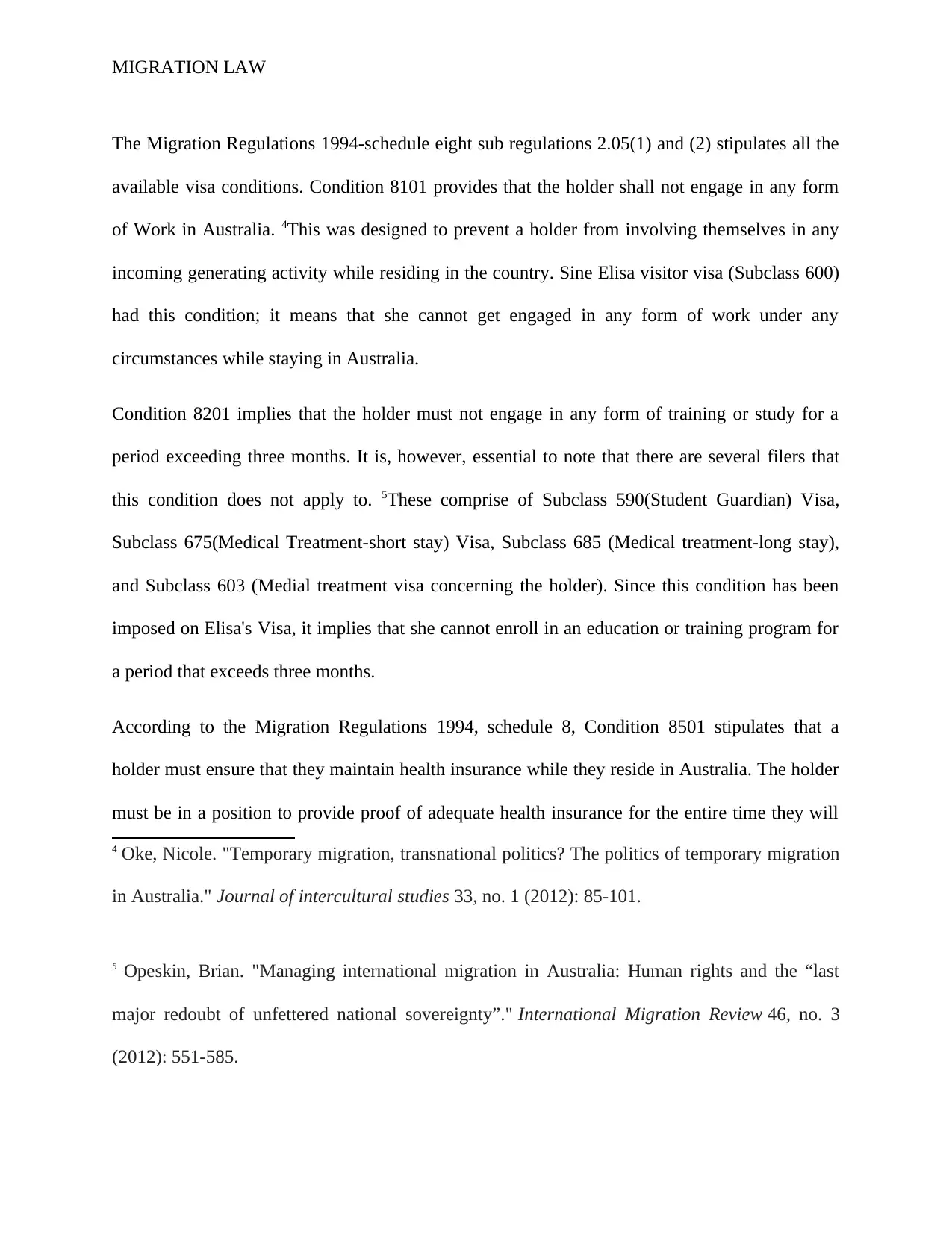
MIGRATION LAW
The Migration Regulations 1994-schedule eight sub regulations 2.05(1) and (2) stipulates all the
available visa conditions. Condition 8101 provides that the holder shall not engage in any form
of Work in Australia. 4This was designed to prevent a holder from involving themselves in any
incoming generating activity while residing in the country. Sine Elisa visitor visa (Subclass 600)
had this condition; it means that she cannot get engaged in any form of work under any
circumstances while staying in Australia.
Condition 8201 implies that the holder must not engage in any form of training or study for a
period exceeding three months. It is, however, essential to note that there are several filers that
this condition does not apply to. 5These comprise of Subclass 590(Student Guardian) Visa,
Subclass 675(Medical Treatment-short stay) Visa, Subclass 685 (Medical treatment-long stay),
and Subclass 603 (Medial treatment visa concerning the holder). Since this condition has been
imposed on Elisa's Visa, it implies that she cannot enroll in an education or training program for
a period that exceeds three months.
According to the Migration Regulations 1994, schedule 8, Condition 8501 stipulates that a
holder must ensure that they maintain health insurance while they reside in Australia. The holder
must be in a position to provide proof of adequate health insurance for the entire time they will
4 Oke, Nicole. "Temporary migration, transnational politics? The politics of temporary migration
in Australia." Journal of intercultural studies 33, no. 1 (2012): 85-101.
5 Opeskin, Brian. "Managing international migration in Australia: Human rights and the “last
major redoubt of unfettered national sovereignty”." International Migration Review 46, no. 3
(2012): 551-585.
The Migration Regulations 1994-schedule eight sub regulations 2.05(1) and (2) stipulates all the
available visa conditions. Condition 8101 provides that the holder shall not engage in any form
of Work in Australia. 4This was designed to prevent a holder from involving themselves in any
incoming generating activity while residing in the country. Sine Elisa visitor visa (Subclass 600)
had this condition; it means that she cannot get engaged in any form of work under any
circumstances while staying in Australia.
Condition 8201 implies that the holder must not engage in any form of training or study for a
period exceeding three months. It is, however, essential to note that there are several filers that
this condition does not apply to. 5These comprise of Subclass 590(Student Guardian) Visa,
Subclass 675(Medical Treatment-short stay) Visa, Subclass 685 (Medical treatment-long stay),
and Subclass 603 (Medial treatment visa concerning the holder). Since this condition has been
imposed on Elisa's Visa, it implies that she cannot enroll in an education or training program for
a period that exceeds three months.
According to the Migration Regulations 1994, schedule 8, Condition 8501 stipulates that a
holder must ensure that they maintain health insurance while they reside in Australia. The holder
must be in a position to provide proof of adequate health insurance for the entire time they will
4 Oke, Nicole. "Temporary migration, transnational politics? The politics of temporary migration
in Australia." Journal of intercultural studies 33, no. 1 (2012): 85-101.
5 Opeskin, Brian. "Managing international migration in Australia: Human rights and the “last
major redoubt of unfettered national sovereignty”." International Migration Review 46, no. 3
(2012): 551-585.
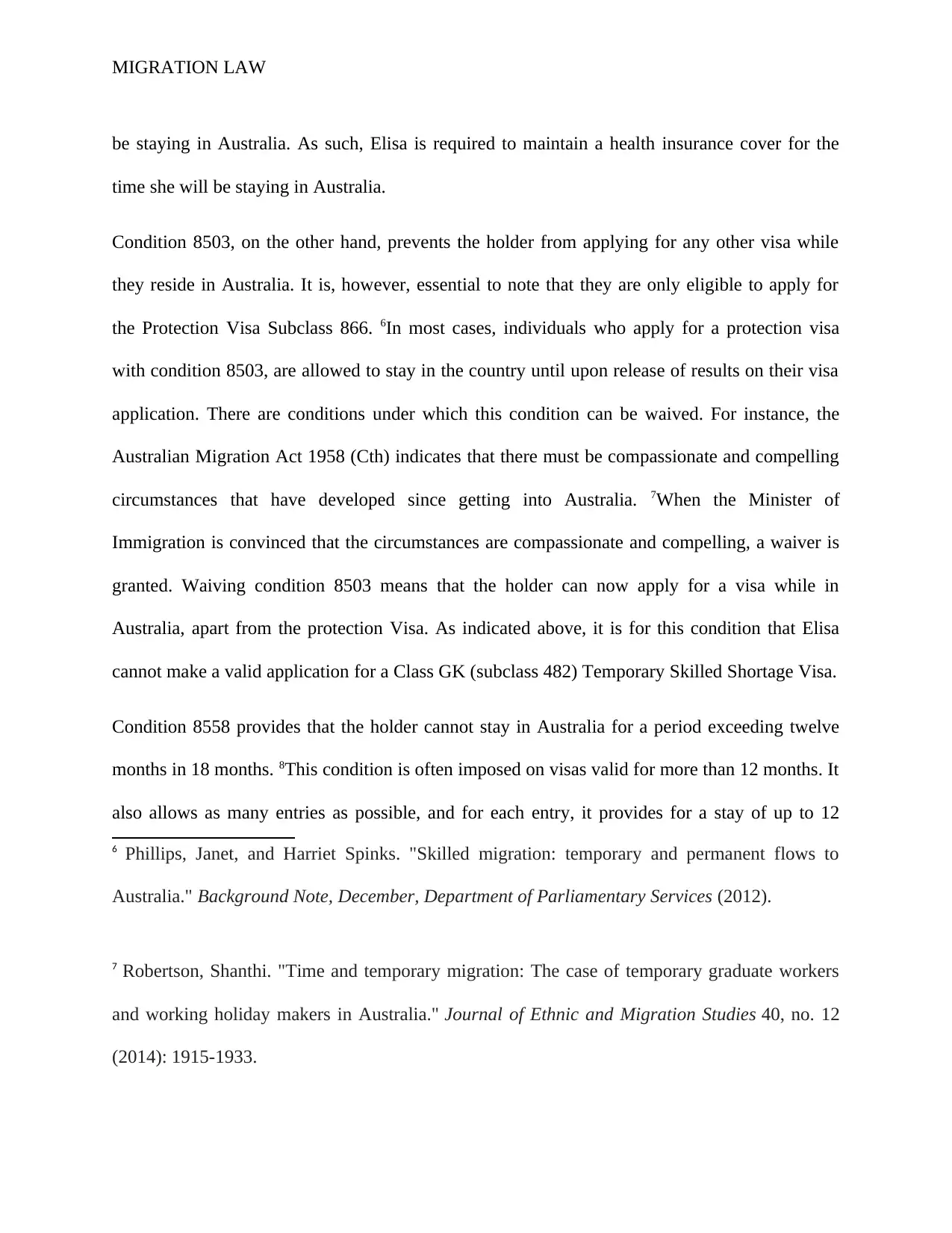
MIGRATION LAW
be staying in Australia. As such, Elisa is required to maintain a health insurance cover for the
time she will be staying in Australia.
Condition 8503, on the other hand, prevents the holder from applying for any other visa while
they reside in Australia. It is, however, essential to note that they are only eligible to apply for
the Protection Visa Subclass 866. 6In most cases, individuals who apply for a protection visa
with condition 8503, are allowed to stay in the country until upon release of results on their visa
application. There are conditions under which this condition can be waived. For instance, the
Australian Migration Act 1958 (Cth) indicates that there must be compassionate and compelling
circumstances that have developed since getting into Australia. 7When the Minister of
Immigration is convinced that the circumstances are compassionate and compelling, a waiver is
granted. Waiving condition 8503 means that the holder can now apply for a visa while in
Australia, apart from the protection Visa. As indicated above, it is for this condition that Elisa
cannot make a valid application for a Class GK (subclass 482) Temporary Skilled Shortage Visa.
Condition 8558 provides that the holder cannot stay in Australia for a period exceeding twelve
months in 18 months. 8This condition is often imposed on visas valid for more than 12 months. It
also allows as many entries as possible, and for each entry, it provides for a stay of up to 12
6 Phillips, Janet, and Harriet Spinks. "Skilled migration: temporary and permanent flows to
Australia." Background Note, December, Department of Parliamentary Services (2012).
7 Robertson, Shanthi. "Time and temporary migration: The case of temporary graduate workers
and working holiday makers in Australia." Journal of Ethnic and Migration Studies 40, no. 12
(2014): 1915-1933.
be staying in Australia. As such, Elisa is required to maintain a health insurance cover for the
time she will be staying in Australia.
Condition 8503, on the other hand, prevents the holder from applying for any other visa while
they reside in Australia. It is, however, essential to note that they are only eligible to apply for
the Protection Visa Subclass 866. 6In most cases, individuals who apply for a protection visa
with condition 8503, are allowed to stay in the country until upon release of results on their visa
application. There are conditions under which this condition can be waived. For instance, the
Australian Migration Act 1958 (Cth) indicates that there must be compassionate and compelling
circumstances that have developed since getting into Australia. 7When the Minister of
Immigration is convinced that the circumstances are compassionate and compelling, a waiver is
granted. Waiving condition 8503 means that the holder can now apply for a visa while in
Australia, apart from the protection Visa. As indicated above, it is for this condition that Elisa
cannot make a valid application for a Class GK (subclass 482) Temporary Skilled Shortage Visa.
Condition 8558 provides that the holder cannot stay in Australia for a period exceeding twelve
months in 18 months. 8This condition is often imposed on visas valid for more than 12 months. It
also allows as many entries as possible, and for each entry, it provides for a stay of up to 12
6 Phillips, Janet, and Harriet Spinks. "Skilled migration: temporary and permanent flows to
Australia." Background Note, December, Department of Parliamentary Services (2012).
7 Robertson, Shanthi. "Time and temporary migration: The case of temporary graduate workers
and working holiday makers in Australia." Journal of Ethnic and Migration Studies 40, no. 12
(2014): 1915-1933.
⊘ This is a preview!⊘
Do you want full access?
Subscribe today to unlock all pages.

Trusted by 1+ million students worldwide
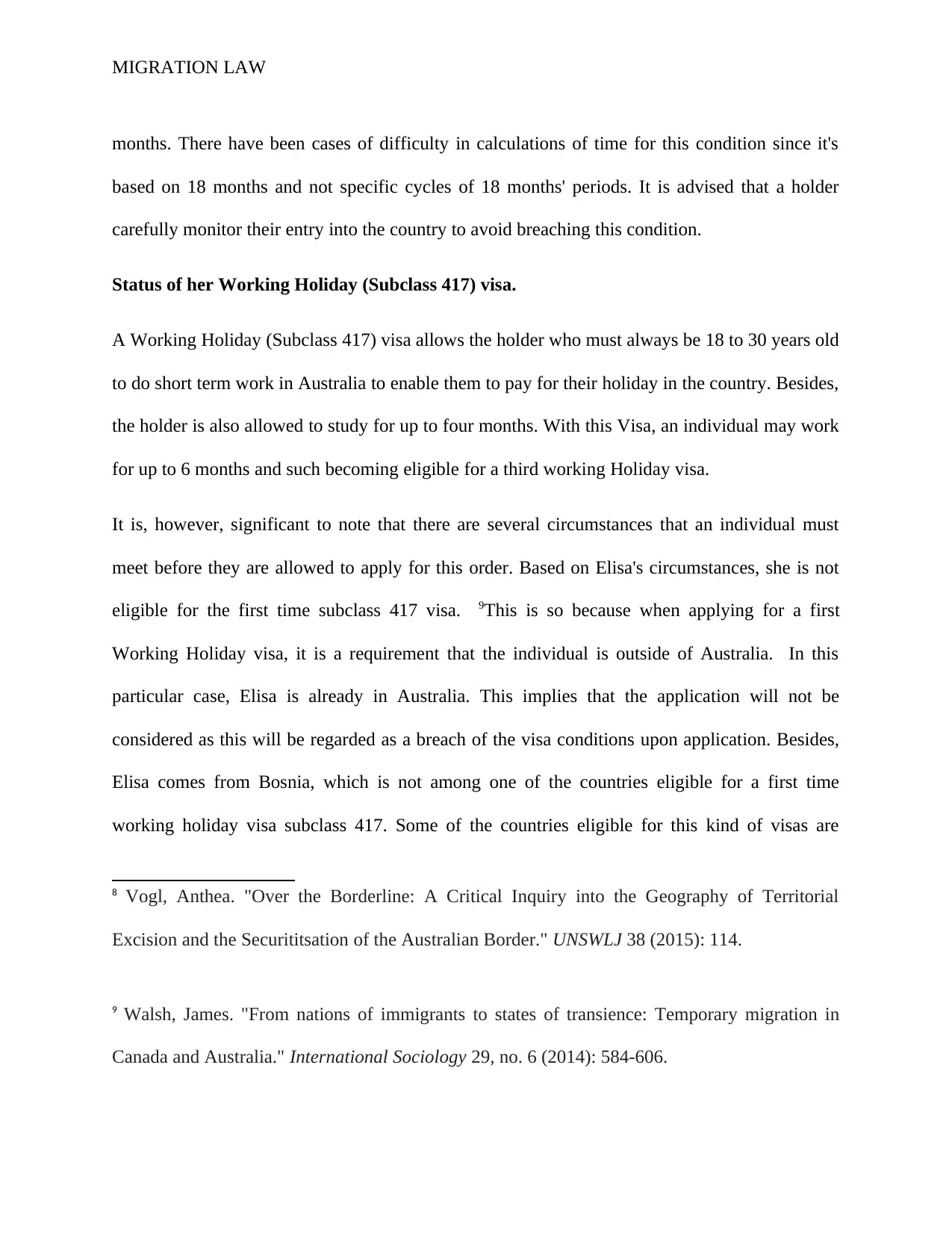
MIGRATION LAW
months. There have been cases of difficulty in calculations of time for this condition since it's
based on 18 months and not specific cycles of 18 months' periods. It is advised that a holder
carefully monitor their entry into the country to avoid breaching this condition.
Status of her Working Holiday (Subclass 417) visa.
A Working Holiday (Subclass 417) visa allows the holder who must always be 18 to 30 years old
to do short term work in Australia to enable them to pay for their holiday in the country. Besides,
the holder is also allowed to study for up to four months. With this Visa, an individual may work
for up to 6 months and such becoming eligible for a third working Holiday visa.
It is, however, significant to note that there are several circumstances that an individual must
meet before they are allowed to apply for this order. Based on Elisa's circumstances, she is not
eligible for the first time subclass 417 visa. 9This is so because when applying for a first
Working Holiday visa, it is a requirement that the individual is outside of Australia. In this
particular case, Elisa is already in Australia. This implies that the application will not be
considered as this will be regarded as a breach of the visa conditions upon application. Besides,
Elisa comes from Bosnia, which is not among one of the countries eligible for a first time
working holiday visa subclass 417. Some of the countries eligible for this kind of visas are
8 Vogl, Anthea. "Over the Borderline: A Critical Inquiry into the Geography of Territorial
Excision and the Securititsation of the Australian Border." UNSWLJ 38 (2015): 114.
9 Walsh, James. "From nations of immigrants to states of transience: Temporary migration in
Canada and Australia." International Sociology 29, no. 6 (2014): 584-606.
months. There have been cases of difficulty in calculations of time for this condition since it's
based on 18 months and not specific cycles of 18 months' periods. It is advised that a holder
carefully monitor their entry into the country to avoid breaching this condition.
Status of her Working Holiday (Subclass 417) visa.
A Working Holiday (Subclass 417) visa allows the holder who must always be 18 to 30 years old
to do short term work in Australia to enable them to pay for their holiday in the country. Besides,
the holder is also allowed to study for up to four months. With this Visa, an individual may work
for up to 6 months and such becoming eligible for a third working Holiday visa.
It is, however, significant to note that there are several circumstances that an individual must
meet before they are allowed to apply for this order. Based on Elisa's circumstances, she is not
eligible for the first time subclass 417 visa. 9This is so because when applying for a first
Working Holiday visa, it is a requirement that the individual is outside of Australia. In this
particular case, Elisa is already in Australia. This implies that the application will not be
considered as this will be regarded as a breach of the visa conditions upon application. Besides,
Elisa comes from Bosnia, which is not among one of the countries eligible for a first time
working holiday visa subclass 417. Some of the countries eligible for this kind of visas are
8 Vogl, Anthea. "Over the Borderline: A Critical Inquiry into the Geography of Territorial
Excision and the Securititsation of the Australian Border." UNSWLJ 38 (2015): 114.
9 Walsh, James. "From nations of immigrants to states of transience: Temporary migration in
Canada and Australia." International Sociology 29, no. 6 (2014): 584-606.
Paraphrase This Document
Need a fresh take? Get an instant paraphrase of this document with our AI Paraphraser
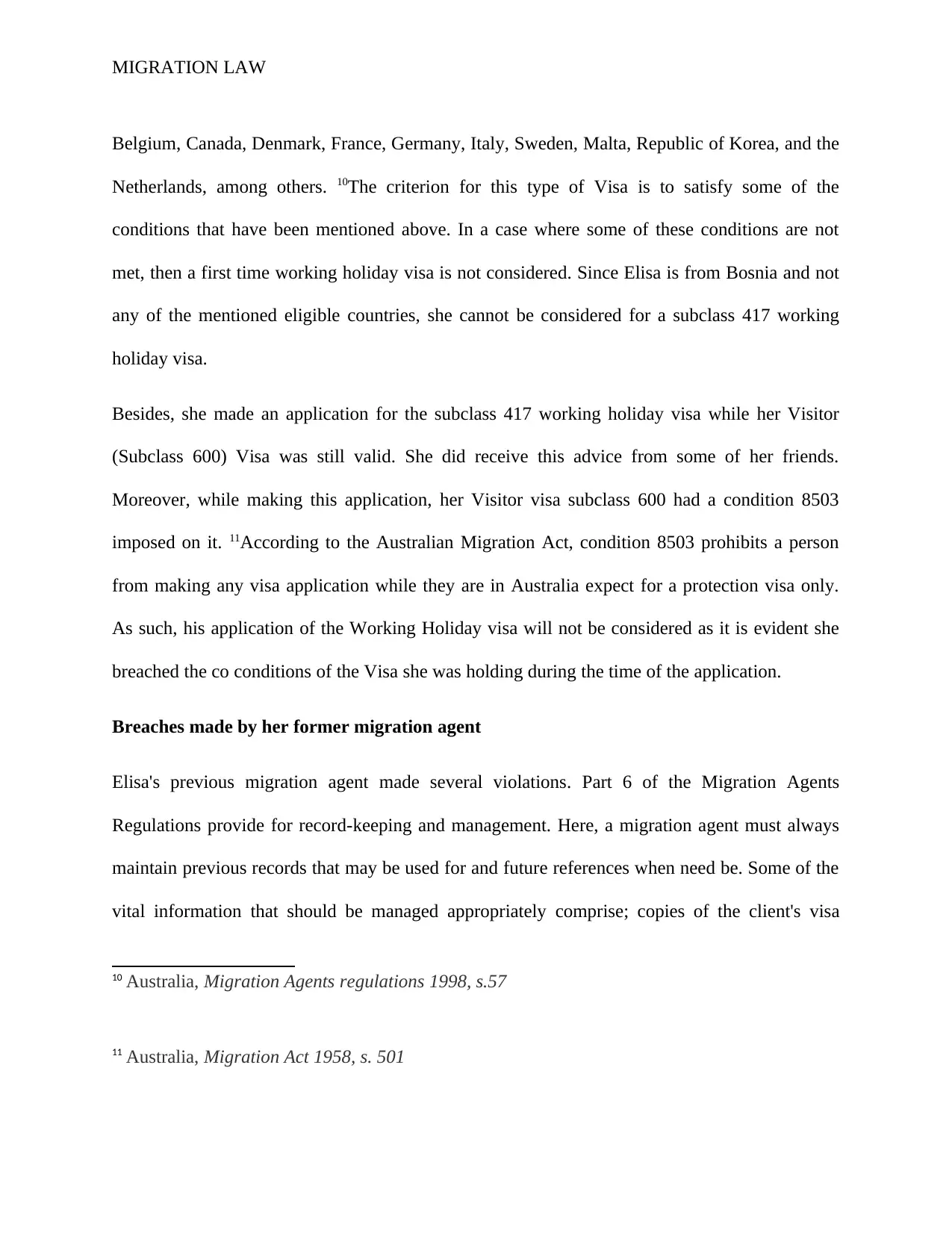
MIGRATION LAW
Belgium, Canada, Denmark, France, Germany, Italy, Sweden, Malta, Republic of Korea, and the
Netherlands, among others. 10The criterion for this type of Visa is to satisfy some of the
conditions that have been mentioned above. In a case where some of these conditions are not
met, then a first time working holiday visa is not considered. Since Elisa is from Bosnia and not
any of the mentioned eligible countries, she cannot be considered for a subclass 417 working
holiday visa.
Besides, she made an application for the subclass 417 working holiday visa while her Visitor
(Subclass 600) Visa was still valid. She did receive this advice from some of her friends.
Moreover, while making this application, her Visitor visa subclass 600 had a condition 8503
imposed on it. 11According to the Australian Migration Act, condition 8503 prohibits a person
from making any visa application while they are in Australia expect for a protection visa only.
As such, his application of the Working Holiday visa will not be considered as it is evident she
breached the co conditions of the Visa she was holding during the time of the application.
Breaches made by her former migration agent
Elisa's previous migration agent made several violations. Part 6 of the Migration Agents
Regulations provide for record-keeping and management. Here, a migration agent must always
maintain previous records that may be used for and future references when need be. Some of the
vital information that should be managed appropriately comprise; copies of the client's visa
10 Australia, Migration Agents regulations 1998, s.57
11 Australia, Migration Act 1958, s. 501
Belgium, Canada, Denmark, France, Germany, Italy, Sweden, Malta, Republic of Korea, and the
Netherlands, among others. 10The criterion for this type of Visa is to satisfy some of the
conditions that have been mentioned above. In a case where some of these conditions are not
met, then a first time working holiday visa is not considered. Since Elisa is from Bosnia and not
any of the mentioned eligible countries, she cannot be considered for a subclass 417 working
holiday visa.
Besides, she made an application for the subclass 417 working holiday visa while her Visitor
(Subclass 600) Visa was still valid. She did receive this advice from some of her friends.
Moreover, while making this application, her Visitor visa subclass 600 had a condition 8503
imposed on it. 11According to the Australian Migration Act, condition 8503 prohibits a person
from making any visa application while they are in Australia expect for a protection visa only.
As such, his application of the Working Holiday visa will not be considered as it is evident she
breached the co conditions of the Visa she was holding during the time of the application.
Breaches made by her former migration agent
Elisa's previous migration agent made several violations. Part 6 of the Migration Agents
Regulations provide for record-keeping and management. Here, a migration agent must always
maintain previous records that may be used for and future references when need be. Some of the
vital information that should be managed appropriately comprise; copies of the client's visa
10 Australia, Migration Agents regulations 1998, s.57
11 Australia, Migration Act 1958, s. 501
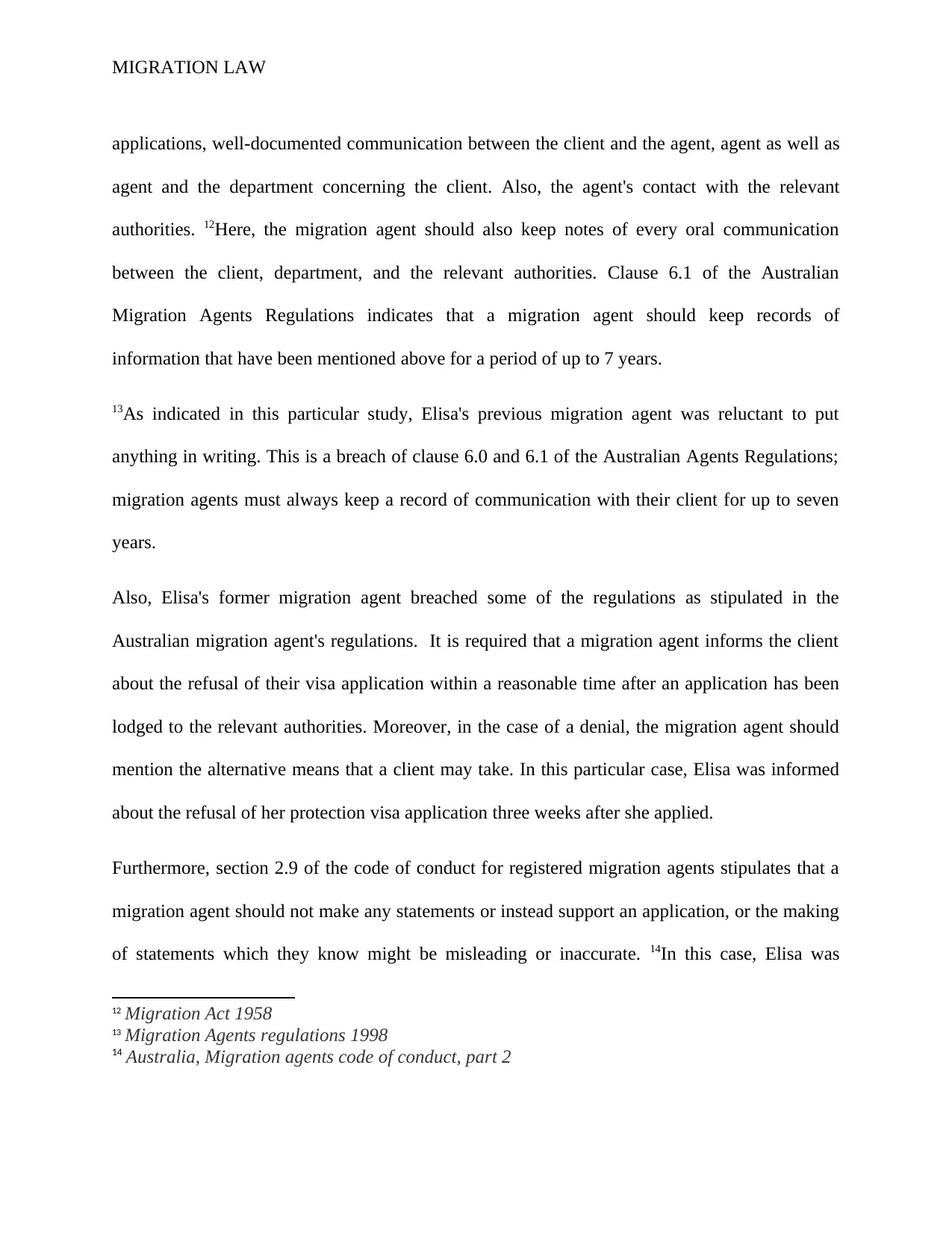
MIGRATION LAW
applications, well-documented communication between the client and the agent, agent as well as
agent and the department concerning the client. Also, the agent's contact with the relevant
authorities. 12Here, the migration agent should also keep notes of every oral communication
between the client, department, and the relevant authorities. Clause 6.1 of the Australian
Migration Agents Regulations indicates that a migration agent should keep records of
information that have been mentioned above for a period of up to 7 years.
13As indicated in this particular study, Elisa's previous migration agent was reluctant to put
anything in writing. This is a breach of clause 6.0 and 6.1 of the Australian Agents Regulations;
migration agents must always keep a record of communication with their client for up to seven
years.
Also, Elisa's former migration agent breached some of the regulations as stipulated in the
Australian migration agent's regulations. It is required that a migration agent informs the client
about the refusal of their visa application within a reasonable time after an application has been
lodged to the relevant authorities. Moreover, in the case of a denial, the migration agent should
mention the alternative means that a client may take. In this particular case, Elisa was informed
about the refusal of her protection visa application three weeks after she applied.
Furthermore, section 2.9 of the code of conduct for registered migration agents stipulates that a
migration agent should not make any statements or instead support an application, or the making
of statements which they know might be misleading or inaccurate. 14In this case, Elisa was
12 Migration Act 1958
13 Migration Agents regulations 1998
14 Australia, Migration agents code of conduct, part 2
applications, well-documented communication between the client and the agent, agent as well as
agent and the department concerning the client. Also, the agent's contact with the relevant
authorities. 12Here, the migration agent should also keep notes of every oral communication
between the client, department, and the relevant authorities. Clause 6.1 of the Australian
Migration Agents Regulations indicates that a migration agent should keep records of
information that have been mentioned above for a period of up to 7 years.
13As indicated in this particular study, Elisa's previous migration agent was reluctant to put
anything in writing. This is a breach of clause 6.0 and 6.1 of the Australian Agents Regulations;
migration agents must always keep a record of communication with their client for up to seven
years.
Also, Elisa's former migration agent breached some of the regulations as stipulated in the
Australian migration agent's regulations. It is required that a migration agent informs the client
about the refusal of their visa application within a reasonable time after an application has been
lodged to the relevant authorities. Moreover, in the case of a denial, the migration agent should
mention the alternative means that a client may take. In this particular case, Elisa was informed
about the refusal of her protection visa application three weeks after she applied.
Furthermore, section 2.9 of the code of conduct for registered migration agents stipulates that a
migration agent should not make any statements or instead support an application, or the making
of statements which they know might be misleading or inaccurate. 14In this case, Elisa was
12 Migration Act 1958
13 Migration Agents regulations 1998
14 Australia, Migration agents code of conduct, part 2
⊘ This is a preview!⊘
Do you want full access?
Subscribe today to unlock all pages.

Trusted by 1+ million students worldwide
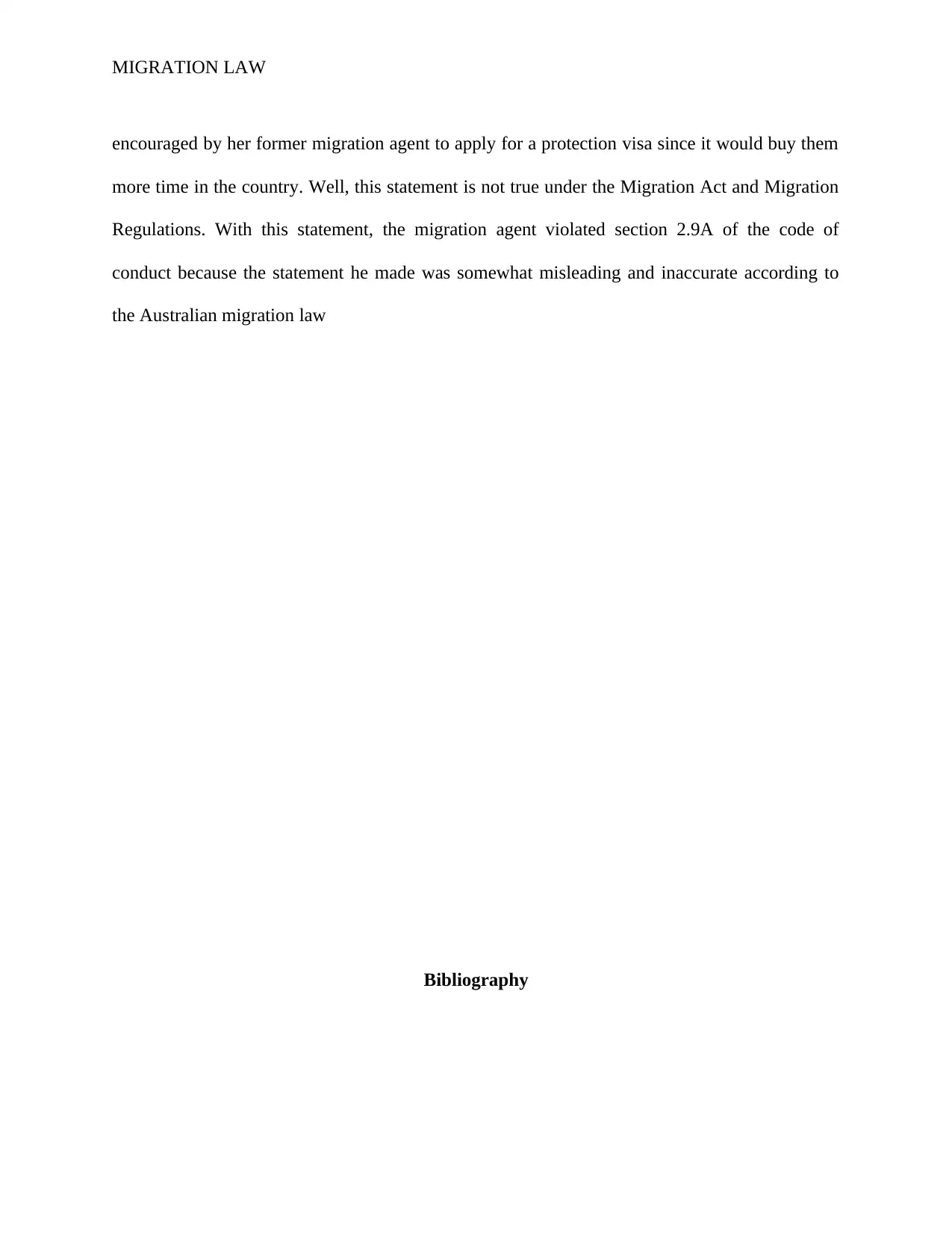
MIGRATION LAW
encouraged by her former migration agent to apply for a protection visa since it would buy them
more time in the country. Well, this statement is not true under the Migration Act and Migration
Regulations. With this statement, the migration agent violated section 2.9A of the code of
conduct because the statement he made was somewhat misleading and inaccurate according to
the Australian migration law
Bibliography
encouraged by her former migration agent to apply for a protection visa since it would buy them
more time in the country. Well, this statement is not true under the Migration Act and Migration
Regulations. With this statement, the migration agent violated section 2.9A of the code of
conduct because the statement he made was somewhat misleading and inaccurate according to
the Australian migration law
Bibliography
Paraphrase This Document
Need a fresh take? Get an instant paraphrase of this document with our AI Paraphraser
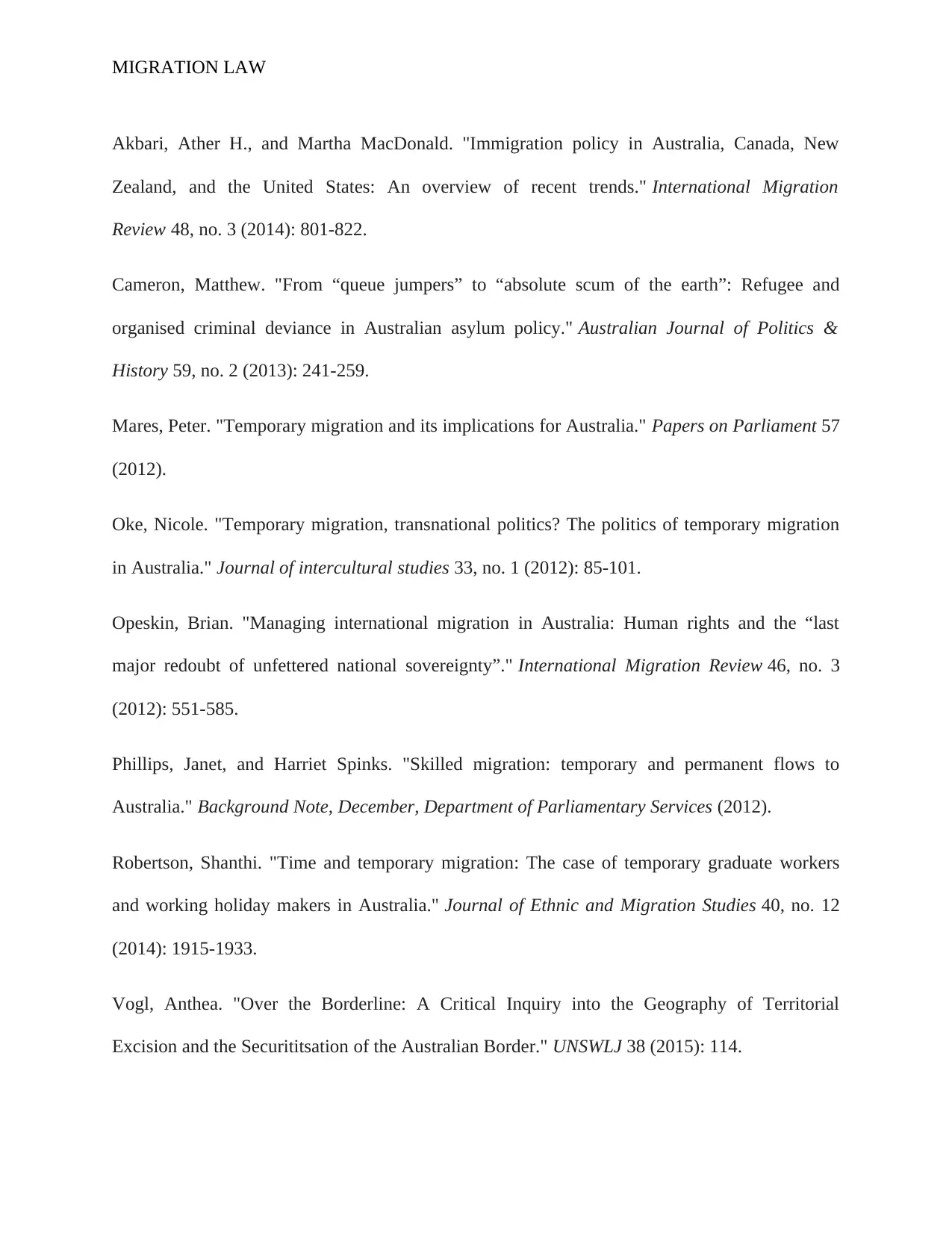
MIGRATION LAW
Akbari, Ather H., and Martha MacDonald. "Immigration policy in Australia, Canada, New
Zealand, and the United States: An overview of recent trends." International Migration
Review 48, no. 3 (2014): 801-822.
Cameron, Matthew. "From “queue jumpers” to “absolute scum of the earth”: Refugee and
organised criminal deviance in Australian asylum policy." Australian Journal of Politics &
History 59, no. 2 (2013): 241-259.
Mares, Peter. "Temporary migration and its implications for Australia." Papers on Parliament 57
(2012).
Oke, Nicole. "Temporary migration, transnational politics? The politics of temporary migration
in Australia." Journal of intercultural studies 33, no. 1 (2012): 85-101.
Opeskin, Brian. "Managing international migration in Australia: Human rights and the “last
major redoubt of unfettered national sovereignty”." International Migration Review 46, no. 3
(2012): 551-585.
Phillips, Janet, and Harriet Spinks. "Skilled migration: temporary and permanent flows to
Australia." Background Note, December, Department of Parliamentary Services (2012).
Robertson, Shanthi. "Time and temporary migration: The case of temporary graduate workers
and working holiday makers in Australia." Journal of Ethnic and Migration Studies 40, no. 12
(2014): 1915-1933.
Vogl, Anthea. "Over the Borderline: A Critical Inquiry into the Geography of Territorial
Excision and the Securititsation of the Australian Border." UNSWLJ 38 (2015): 114.
Akbari, Ather H., and Martha MacDonald. "Immigration policy in Australia, Canada, New
Zealand, and the United States: An overview of recent trends." International Migration
Review 48, no. 3 (2014): 801-822.
Cameron, Matthew. "From “queue jumpers” to “absolute scum of the earth”: Refugee and
organised criminal deviance in Australian asylum policy." Australian Journal of Politics &
History 59, no. 2 (2013): 241-259.
Mares, Peter. "Temporary migration and its implications for Australia." Papers on Parliament 57
(2012).
Oke, Nicole. "Temporary migration, transnational politics? The politics of temporary migration
in Australia." Journal of intercultural studies 33, no. 1 (2012): 85-101.
Opeskin, Brian. "Managing international migration in Australia: Human rights and the “last
major redoubt of unfettered national sovereignty”." International Migration Review 46, no. 3
(2012): 551-585.
Phillips, Janet, and Harriet Spinks. "Skilled migration: temporary and permanent flows to
Australia." Background Note, December, Department of Parliamentary Services (2012).
Robertson, Shanthi. "Time and temporary migration: The case of temporary graduate workers
and working holiday makers in Australia." Journal of Ethnic and Migration Studies 40, no. 12
(2014): 1915-1933.
Vogl, Anthea. "Over the Borderline: A Critical Inquiry into the Geography of Territorial
Excision and the Securititsation of the Australian Border." UNSWLJ 38 (2015): 114.
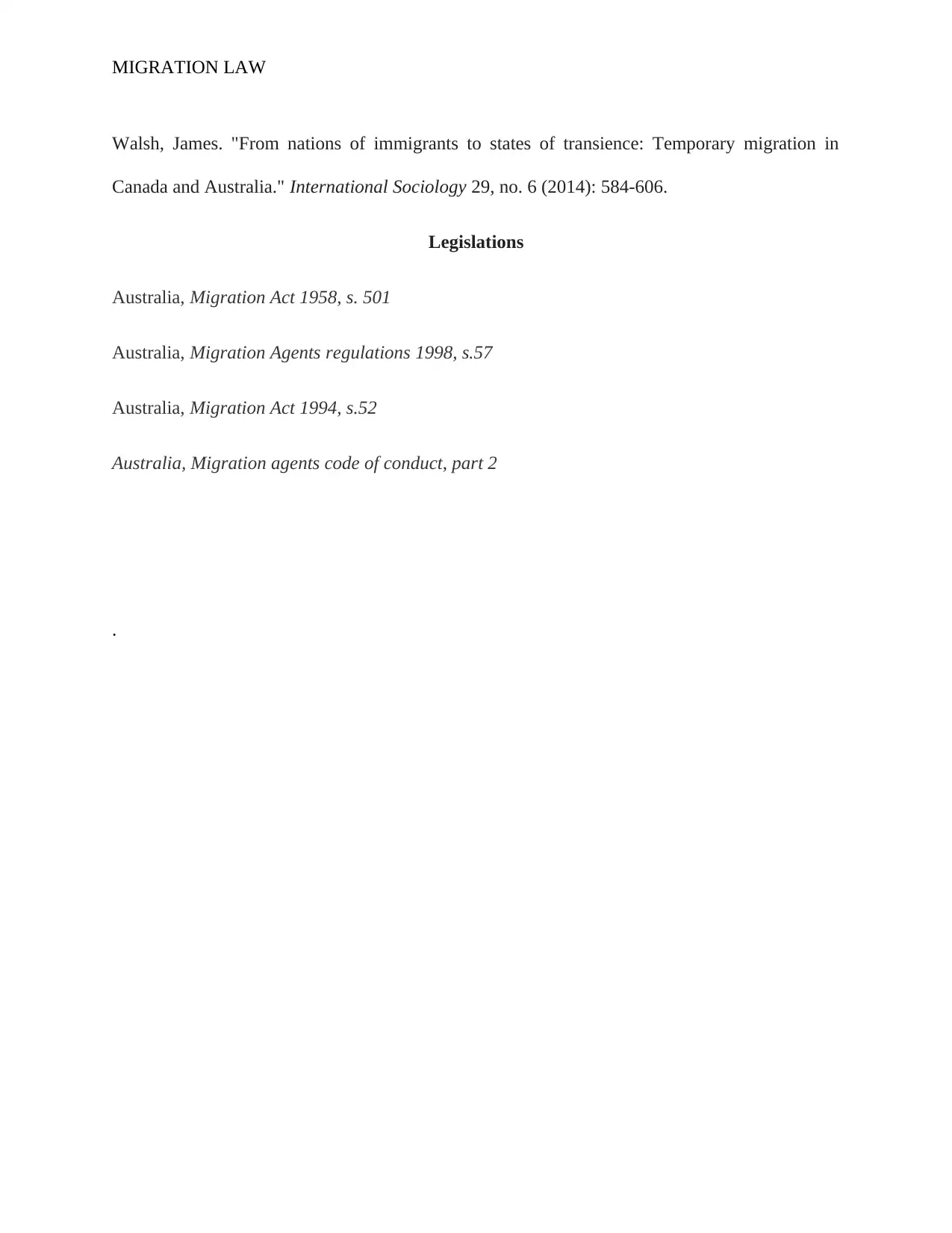
MIGRATION LAW
Walsh, James. "From nations of immigrants to states of transience: Temporary migration in
Canada and Australia." International Sociology 29, no. 6 (2014): 584-606.
Legislations
Australia, Migration Act 1958, s. 501
Australia, Migration Agents regulations 1998, s.57
Australia, Migration Act 1994, s.52
Australia, Migration agents code of conduct, part 2
.
Walsh, James. "From nations of immigrants to states of transience: Temporary migration in
Canada and Australia." International Sociology 29, no. 6 (2014): 584-606.
Legislations
Australia, Migration Act 1958, s. 501
Australia, Migration Agents regulations 1998, s.57
Australia, Migration Act 1994, s.52
Australia, Migration agents code of conduct, part 2
.
⊘ This is a preview!⊘
Do you want full access?
Subscribe today to unlock all pages.

Trusted by 1+ million students worldwide
1 out of 12
Related Documents
Your All-in-One AI-Powered Toolkit for Academic Success.
+13062052269
info@desklib.com
Available 24*7 on WhatsApp / Email
![[object Object]](/_next/static/media/star-bottom.7253800d.svg)
Unlock your academic potential
Copyright © 2020–2026 A2Z Services. All Rights Reserved. Developed and managed by ZUCOL.





